In this week’s review of Court Judgments, we look at Supreme Court’s ruling that it is entirely within the realm of privacy of a woman to decide whether to bear a child or abort her pregnancy, Delhi HC’s decision that if a certificate given by a medical practitioner is untrue, misleading or improper, he is liable to have his name removed from the rolls, Karnataka HC’s decision that no contributory negligence can be attributed to a deceased driver who was involved in an accident with a vehicle negligently parked on a National Highway among others.
SC: It is entirely within the realm of privacy of a woman to decide whether to bear a child or abort her pregnancy
In Indra Kunwar vs. the State of Chhattisgarh, the Supreme Court had to address the issue of whether an accused woman is obligated to disclose private aspects of her life during a criminal trial. Another question before the Court was regarding the extent of the rights or duties of the accused to explain the incriminating circumstances appearing against them in a statement under Section 313 of the Code of Criminal Procedure (Cr. P.C)
The case involved a woman who was convicted of killing her child and sentenced to life imprisonment. She had relations with a co-villager, as a result of which she conceived a child. It was alleged that she killed this child after giving birth and threw the corpse into a small water body.
The trial court inferred her guilt based on her admission of pregnancy and her status as a woman living alone. However, the Supreme Court criticized this approach, stating that it lacked a solid foundation and reinforced gender stereotypes. A bench of Justices Abhay S Oka and Sanjay Karol highlighted the importance of a woman’s right to privacy, especially in matters related to her body and reproductive choices, emphasizing that it falls within the realm of privacy for a woman to decide whether to bear a child or terminate a pregnancy within the legal framework.
The Court also emphasized that an accused person’s statement under Section 313 of the Cr. P.C should not lead to negative inferences, and the accused’s right to remain silent or provide a false answer should not be used against them. The accused’s statement in this case did not reflect an answer to questions regarding the child.
After a detailed examination of the evidence, the Court found that none of the witnesses could prove the prosecution’s case beyond a reasonable doubt. The appellant denied the accusations, claiming that the child’s father had forcibly caused her miscarriage. In light of these gaps in the prosecution’s case and the lack of conclusive evidence, the Court allowed the appeal, criticizing the trial court and the High Court for their handling of the case while acquitting the accused of all charges.
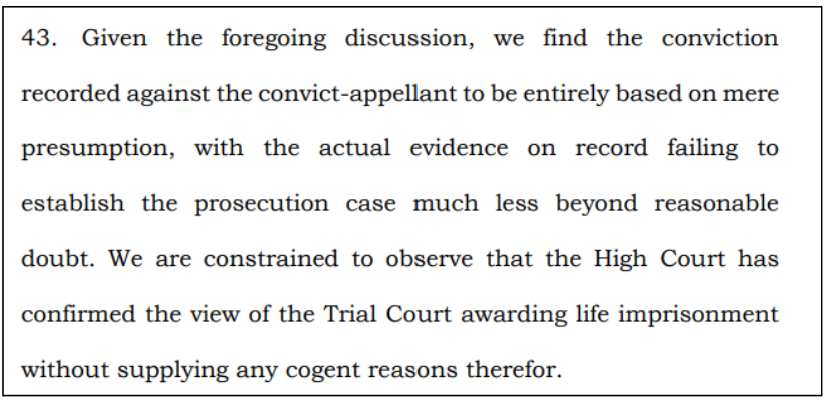
Delhi HC: If a certificate given by a medical practitioner is untrue, misleading, or improper, he is liable to have his name removed from the rolls
In Dr. Neena Raizada vs. Medical Council of India through its Secretary, the challenge was about the improper issuance of a medical certificate by two doctors. The allegation of the Complainant, who herself is a doctor, was that Dr. Arti Lalchandani and Dr. Ravi Kumar issued the certificate even without examining the Complainant/Petitioner.
Initially, before approaching the Supreme Court, the case was brought before the Uttar Pradesh Medical Council, which noted that the two doctors should not have provided their “opinion” on the official letterhead of the Indian Medical Association (IMA), Kanpur, without conducting a personal examination of the patient.
The petitioner then appealed against the UP Medical Council’s decision, leading the Committee of the Medical Council of India to find the two doctors guilty of professional misconduct and violating Regulation 7.7 of the Indian Medical Council (Professional Conduct, Etiquette, and Ethics) Regulations of 2002.
Regulation 7.7 stipulates that any registered medical practitioner who issues an improper certificate is liable to have their name removed from the Register. Regulation 8.2, on the other hand, states that if a medical practitioner is found guilty of professional misconduct, the appropriate Medical Council may impose any necessary punishment or direct the removal of the practitioner’s name from the Register, either temporarily or permanently. Justice Subramonium Prasad, after examining the relevant provisions and legal precedents, concluded that the punishment specified in Regulation 7.7 was not implicitly excluded by the powers granted to the Medical Council under Regulation 8.2. The appeal was then dismissed.
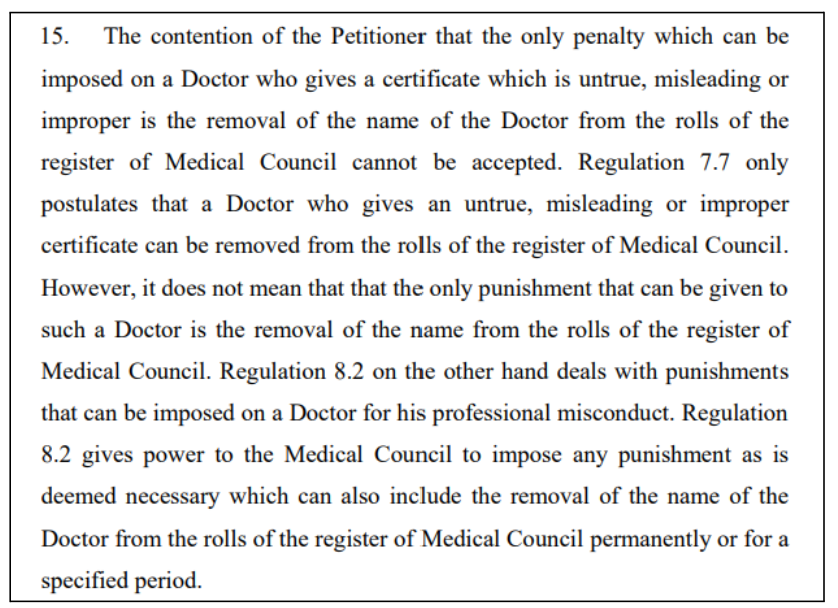
Karnataka HC: No contributory negligence can be attributed to a deceased driver who was involved in an accident with a vehicle negligently parked on a National Highway
The case involved an insurance company, Future Gen India INS Co. Ltd, challenging the tribunal’s order to pay compensation of Rs. 8,74,000 to the claimants of the deceased, Sadique Hussain. The accident had occurred in November 2014 when Sadique Hussain was riding a motorcycle on the Solapur – Vijayapur road. The motorcycle rider couldn’t see the parked vehicles and collided with the tractor-trailer, leading to his death. A tractor with two trailers was parked on the road at night without any indicators.
The insurance company argued that the accident was caused by the negligent parking of the tractor-trailer, leading to the death of the motorcycle rider and so the tribunal should have divided the liability between the insurer of the trailer and the insurer of the tractor. Their contention was that negligence should not be automatically assigned to the driver of the tractor-trailer simply because the vehicles were parked on the road. They emphasized the necessity for specific evidence demonstrating that the accident occurred despite the deceased taking adequate precautions while riding.
A single-judge bench in Karnataka High Court of Justice Ravi V Hosmani pointed out that according to Regulation 15(1) of the Road Regulation of 1989, it is prohibited to park motor vehicles on the road without taking proper precautions. Furthermore, the accident took place on a national highway, where vehicles typically travel at high speeds.
The court held that in the absence of specific evidence regarding precautionary measures taken by the driver of the tractor-trailer, such as switching on indicators, parking lights, and placing barricades, the tribunal was justified in assigning the entire negligence to the tractor-trailer driver while absolving the motorcycle rider of negligence was considered justified.
Regarding the apportionment of liability, the bench stated that since the trailers cannot move by themselves and are towed by the tractor, the insurer of the tractor should be held liable to pay the entire compensation, which is in accordance with the law. As a result, the appeal was dismissed.
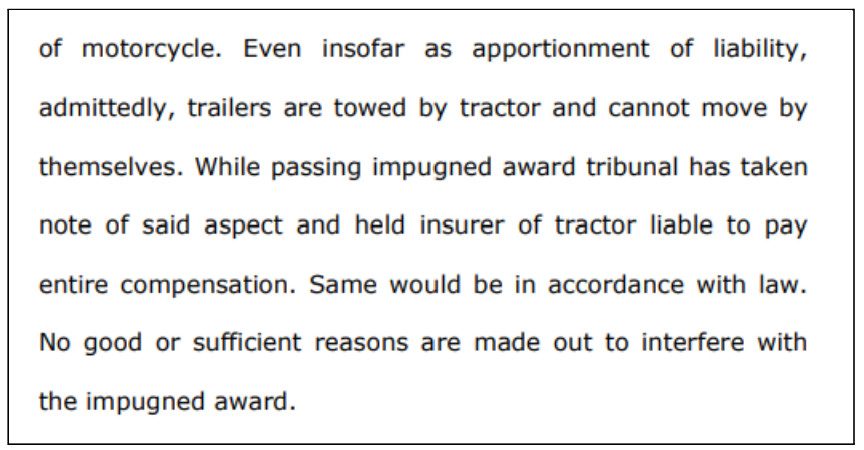
Rajasthan HC: Employees should be given fair opportunity before dismissing them
In the case, Sanjay Dadich vs. The State of Rajasthan, the State Government had dismissed a Physical Education Teacher (PET) from their position, alleging that the teacher had submitted a forged sports certificate to secure the appointment. The petitioner had initially applied for the role in 1998 but was denied due to doubts about his degree. In 2005, a court instructed a re-examination of his qualifications, considering his state-level certificate. He was hired in 2006 but was fired in 2007 over alleged fake sports certificates. His dismissal was withdrawn in May 2007, pending an investigation into the certificates’ authenticity. The challenge against this dismissal was that the teacher had not been provided with any notice of a chargesheet, and no formal inquiry had been conducted before the dismissal.
The Rajasthan High Court’s Jaipur Bench of Justice Anoop Kumar Dhand highlighted the importance of affording government employees facing dismissal or removal under Article 311(2) of the Indian Constitution a fair opportunity. The court ruled that, as a permanent government employee, the petitioner was entitled to the protections specified in Article 311(2). His dismissal without a proper investigation violated the principles of natural justice and constitutional protection, it noted. The Court gave permission to the officials to conduct a new investigation, with the condition that they must finish it within six months.
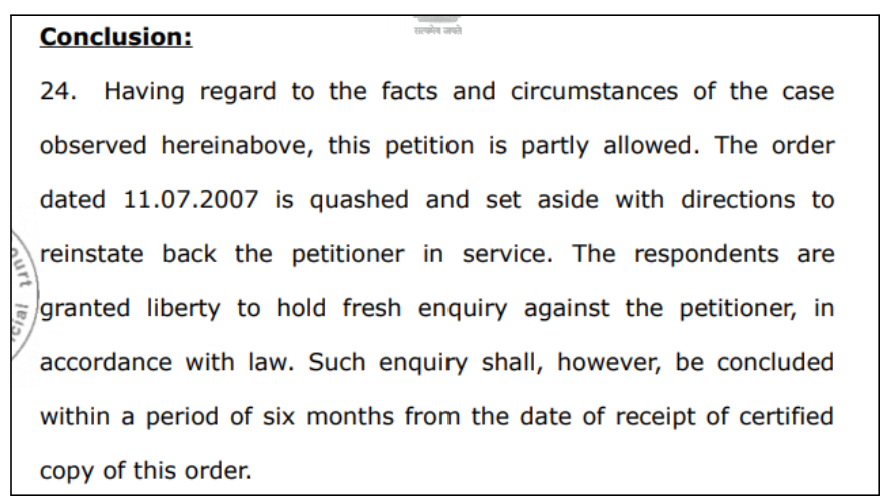
Allahabad HC: Authorities should issue circulars from time to time on issues decided by the Courts to reduce burden on Courts
In the case, Nageena Singh vs. State Of Uttar Pradesh, the petitioner disputed a recovery order issued by the District Magistrate, Azamgarh, under Section 27 of the U.P. Panchayat Raj Act. The petitioner’s argument was that the inquiry was not conducted by the Chief Audit Officer as the law required. The petitioner’s situation was similar to a previous decision by the Allahabad High Court in the case of Dinesh Kumar and others vs. State of Uttar Pradesh and others. The Court, while allowing the present case, observed that multiple petitions regarding the same issue were being filed before the Court.
The Court also noted that these kinds of petitions were overwhelming the Court’s roster with unimportant and trivial cases. This was happening because government officials were not properly informed and continued to bring up issues that the Court had already addressed and ruled on in detail. In this context, the Court expressed that it is the duty of the State Law Officers, who are compensated by public funds, to guide government authorities in issuing periodic circulars on matters already resolved by the Courts.
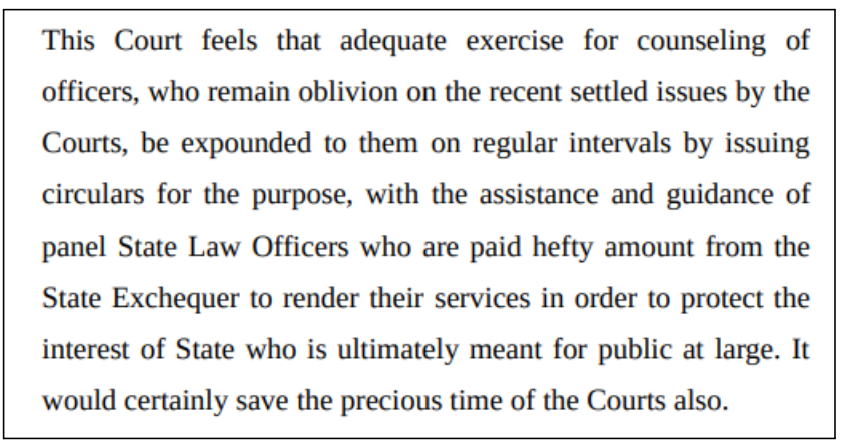
Featured Image: Court Judgements


